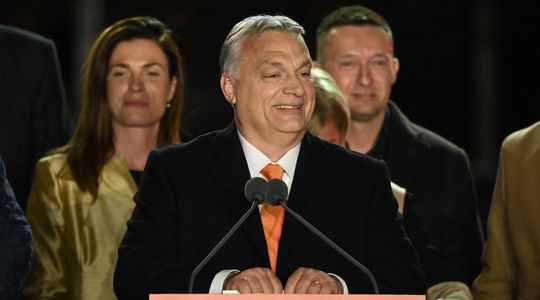Reelected for a fourth consecutive term with more than 53% of the vote, Viktor Orban relied on a posture of defender of the nation, threatened by the war in Ukraine and the left, in order to beat his opponent Péter Márki-Zay. If this victory strengthens his grip on Hungary, which he has ruled since 2010, his closeness to Vladimir Putin and his so-called doctrine of openness to the East risk accentuating Budapest’s European isolation – notwithstanding his condemnation of the aggression. Russia and welcoming Ukrainian refugees with open arms.
With his famous “peacock dance”, the Eurocritical leader willingly recovers subsidies from Brussels, while courting Moscow and Beijing. A perilous balancing act. “Two-thirds of Hungarians believe that Viktor Orban is eroding European unity through his strategic friendship with Putin, while reaping the benefits of European Union membership. This strategy is dead. Try as he might, Orban can no longer have it both ways,” said analyst Andras Pulai.
mirage of a coalition
In March 2021, the break of his party, Fidesz, with the European People’s Party (EPP), the main right-wing family of the Twenty-Seven, marginalized the troops of the Danubian populist, already in conflict for twelve years with Brussels. His hope for a radical conservative grand coalition in the European Parliament turns into a mirage. Orban’s caution towards Putin, in order to preserve his policy of low energy prices, is ruining his relationship with his central European associates in the Visegrad Group – especially the très Atlanticist Poland.
A lifelong ally of Orban in the face of Brussels’ charges on the rule of law, Warsaw is now turning away from Hungary and refusing to send arms to Ukraine. “Budapest convinced the Polish executive for years that its ‘friction’ with the Russians was based on pragmatic foundations. Now the ruling Polish PiS is moving back into the EU, while Viktor Orban is becoming more isolated in addition with his Eurosceptic, anti-Western and pro-Kremlin point of view,” said political scientist Edit Zgut.
And now the Balkans
In order to maintain a regional influence, “Viktor” invests the Balkans. Budapest has pawns among the Slovenian and Macedonian media. Magyar firms have become major players in banking and telecommunications in Albania. Last fall, Orban supported the separatist ambitions of Bosnian Serb leader Milorad Dodik. And above all, he cultivates a boundless friendship with the ultra pro-Kremlin Serbian president, Aleksandar Vucic, largely renewed the same day as him.
Viktor Orban has built a highly sulphurous reputation on the Old Continent between anti-democratic excesses, creation of a loyal media empire, distortions of the independence of justice, oligarchization of the economy, anti-migrant diatribes and stigmatization of the LGBT community. Today, he is sinking deeper into his Putin-style “democracy”, continuing his crusade against “Soros activists” and “Brussels bureaucrats”. Even if it means becoming an outcast for good.
